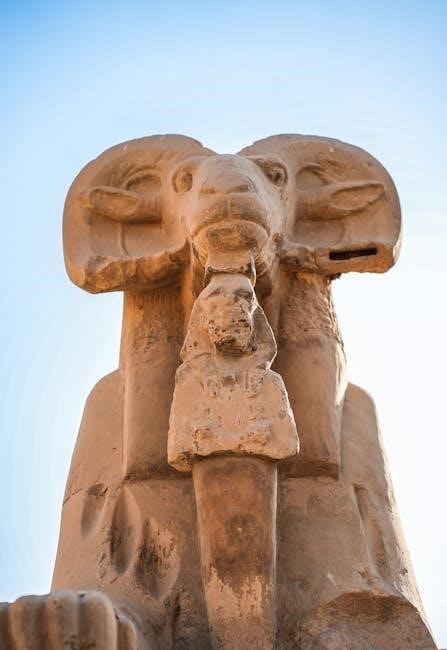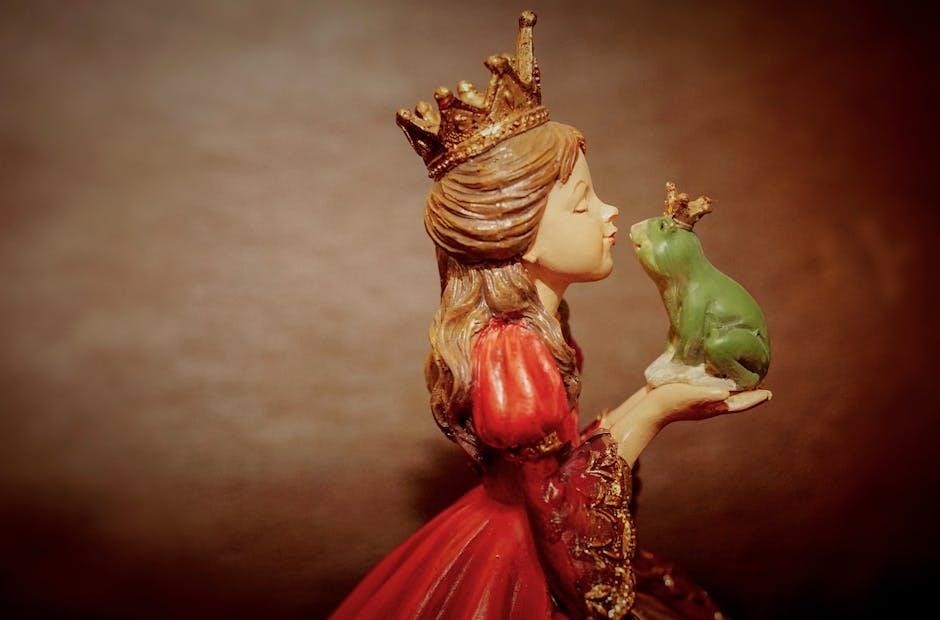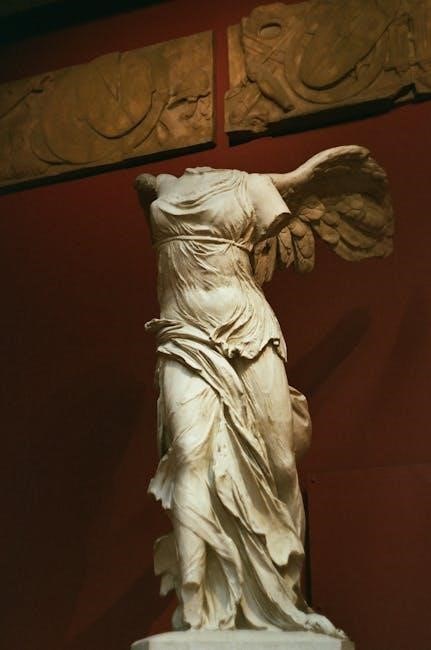
mythology by edith hamilton pdf
Edith Hamilton’s Mythology is a timeless exploration of Greek, Roman, and Norse myths, offering a modern lens to ancient stories. First published in 1942, it remains a cornerstone of classical literature, captivating readers with its accessible and engaging narrative. The book’s enduring popularity lies in its ability to bridge the past and present, making mythology relatable and inspiring. Its digital edition, available as a PDF, ensures that Hamilton’s profound insights are conveniently accessible to new generations of readers worldwide.
1.1 Overview of the Book
Edith Hamilton’s Mythology is a comprehensive exploration of Greek, Roman, and Norse myths, retold with clarity and depth. Published in 1942, the book serves as a modern interpretation of ancient stories, blending drama, philosophy, and history. It masterfully captures the essence of classical mythology, making it accessible to a broad audience. The PDF version of the book retains its original charm while offering a convenient format for contemporary readers, ensuring Hamilton’s work remains a timeless resource for understanding mythological heritage;
1.2 Historical Context and Publication Details
Mythology by Edith Hamilton was first published in 1942 by Little, Brown and Company, becoming an instant classic. It emerged during a time of renewed interest in classical studies, offering a fresh perspective on ancient myths. The book’s 75th anniversary edition, released in 2017, features stunning illustrations, enhancing its appeal. The PDF version ensures accessibility, allowing modern readers to explore Hamilton’s seminal work, which has sold millions of copies worldwide, solidifying its place as a cornerstone of mythological literature.
The Author: Edith Hamilton
Edith Hamilton was a renowned American educator and author, best known for her work in popularizing classical mythology. Her expertise and passion for ancient cultures shine in Mythology, making it a beloved resource for scholars and casual readers alike. The PDF edition ensures her timeless insights remain accessible to modern audiences, fostering a deeper appreciation for mythological traditions.
2.1 Biography and Contributions to Classical Literature
Edith Hamilton was a distinguished American educator and author, born in 1867 and passing away in 1963. Her profound knowledge of classical cultures and literature led her to become a pioneer in making mythology accessible to modern audiences. Hamilton’s teaching career at the Bryn Mawr School for Girls laid the foundation for her writing. Her iconic book, Mythology, first published in 1942, revolutionized the way myths were presented, blending scholarship with engaging storytelling. The PDF version of her work ensures her legacy endures, offering timeless insights into classical literature for readers worldwide.

2.2 Why “Mythology” Became a Timeless Classic
Edith Hamilton’s Mythology became a timeless classic due to its masterful retelling of ancient myths with modern clarity and depth. Its universal themes, such as human nature and the struggle between fate and free will, resonate across generations. Hamilton’s ability to weave Greek, Roman, and Norse myths into a cohesive narrative captivated readers, making it a cornerstone of classical literature. The book’s enduring popularity is further enhanced by its availability in PDF, ensuring its accessibility and relevance in the digital age.

Structure and Content of the Book
Edith Hamilton’s Mythology masterfully organizes Greek, Roman, and Norse myths, presenting them with clarity. The PDF version maintains this structure, offering readers an accessible and engaging experience digitally;
3.1 Greek Mythology: Key Stories and Themes
Edith Hamilton’s Mythology delves into Greek myths, showcasing iconic tales of gods like Zeus, Hera, and Poseidon, alongside heroes such as Hercules and Perseus. Themes of fate, free will, and humanity’s struggles are central. The PDF version preserves Hamilton’s vivid storytelling, making these ancient narratives accessible and engaging. Her approach highlights the timeless relevance of Greek mythology, connecting readers to universal human experiences. The digital format enhances readability, ensuring these stories remain a vital part of cultural heritage for modern audiences.
3.2 Roman Mythology: Similarities and Differences
Edith Hamilton’s Mythology explores Roman mythology, emphasizing its practical focus on state and family compared to Greek mythology’s emotional depth. Roman gods, like Jupiter and Mars, were often aligned with Greek counterparts but served civic purposes. The PDF edition highlights these distinctions, offering insights into how Roman myths reflected their culture’s values. Hamilton’s narrative bridges these traditions, making the complexities of Roman mythology accessible and engaging for modern readers in a clear, concise manner.
3.3 Norse Mythology: Its Unique Place in the Book
Edith Hamilton’s Mythology devotes a distinct section to Norse mythology, highlighting its darker, more philosophical tone compared to Greek and Roman myths. The PDF edition elaborates on the Norse cosmos, the concept of destiny, and the epic tale of Ragnarok. Hamilton’s portrayal captures the unique cultural and spiritual essence of Norse beliefs, offering readers a profound contrast to the other mythologies. This section enriches the book’s diversity, showcasing the universal themes of human existence across cultures.
Themes and Cultural Significance
Exploring themes like human nature, morality, and the struggle between order and chaos, Hamilton’s Mythology bridges ancient myths with modern understanding, highlighting their timeless relevance.
4.1 The Human Condition in Mythology
Edith Hamilton’s Mythology masterfully explores the human condition, revealing universal truths about mortality, ambition, and emotion. Through timeless stories of gods and heroes, Hamilton illustrates the complexities of human nature, such as the struggle between reason and passion, the inevitability of fate, and the quest for self-discovery. These themes, deeply rooted in ancient myths, continue to resonate with modern readers, offering insights into shared human experiences. The PDF edition ensures these profound reflections remain accessible and relevant in the digital age.
4.2 Influence of Mythology on Art, Literature, and Culture
Mythology, as presented by Edith Hamilton, has profoundly shaped art, literature, and culture. From inspiring masterpieces in Renaissance art to influencing modern literature, myths have served as a creative wellspring. Hamilton’s work bridges the ancient and modern, showcasing how myths continue to inspire contemporary artists, writers, and thinkers. The PDF edition of her book ensures that this cultural legacy remains accessible, allowing new generations to draw from its rich narrative traditions and timeless themes, fostering ongoing creativity and cultural enrichment across disciplines.
Reception and Legacy

Edith Hamilton’s Mythology has become a beloved classic, with millions of copies sold worldwide. Its enduring popularity highlights its timeless appeal, making it a foundational text for understanding mythological traditions. The PDF edition ensures its legacy endures, offering modern readers easy access to Hamilton’s insightful retelling of ancient myths.
5.1 Initial Reception and Popularity
First published in 1942 by Little, Brown and Company, Mythology quickly became a bestseller, praised for its clear and engaging style. The book’s ability to make ancient myths accessible to modern readers resonated widely, establishing it as a classic in its field. Its popularity soared, and by the time the PDF edition was released, it had already sold millions of copies worldwide, solidifying its status as a timeless resource for understanding Greek, Roman, and Norse mythology.
5.2 Enduring Appeal in the Modern Era
Decades after its release, Mythology remains a beloved resource, with its PDF edition ensuring accessibility for modern readers. The book’s timeless themes, such as the human condition and universal truths, continue to captivate audiences. Its influence is evident in literature, art, and popular culture, making it a vital read for both scholars and casual enthusiasts. The digital format has further enhanced its reach, allowing new generations to explore Hamilton’s masterful storytelling and profound insights into classical myths.

The “Mythology by Edith Hamilton PDF” Edition
The PDF edition of Mythology offers a convenient and accessible format, ensuring timeless stories reach modern readers. Its digital availability has broadened its appeal globally.
6.1 Availability and Formats
The Mythology by Edith Hamilton PDF is widely available in digital formats, including PDF, ensuring easy access for modern readers. It can be downloaded from various online platforms like Amazon, Google Books, and other e-bookstores. The PDF version is compatible with multiple devices, making it convenient for reading on smartphones, tablets, and computers. Additionally, many websites offer free previews or samples, allowing readers to explore the content before purchasing. This digital accessibility has significantly expanded the book’s reach and popularity among diverse audiences worldwide.
6.2 Benefits of the Digital Version
The Mythology by Edith Hamilton PDF offers unparalleled convenience and accessibility. Readers can easily navigate the text, highlight sections, and search for specific myths or themes using keyword searches. The digital format allows for seamless access across devices, making it ideal for students, researchers, and enthusiasts. Additionally, the PDF preserves the book’s original structure and illustrations, ensuring an immersive reading experience. Its portability and environmental mindfulness make it a preferred choice for modern readers seeking a sustainable way to explore timeless myths.

Study Guide and Reading Tips

Utilize the PDF version for easy navigation and keyword searches. Highlight key myths and themes, and take digital notes for deeper understanding and quick reference.
7;1 How to Approach the Book for Maximum Understanding
Start by skimming the table of contents to grasp the structure. Focus on key myths and themes, taking notes on digital versions for easy reference. Use the PDF’s search function to explore connections between stories. Prioritize understanding the human emotions and universal themes rather than memorizing details. Discuss the book with others or join online forums to deepen insights. Supplement your reading with online resources and summaries for clarity. Approach the text with curiosity, allowing the myths to illuminate timeless human experiences and cultural significance.
7.2 Resources for Further Exploration
Supplement your reading with online courses, such as those on Coursera or edX, which explore mythology in depth. Websites like Khan Academy offer free articles and videos on classical myths. Additionally, podcasts like Mythunderstandings provide engaging discussions. For visual learners, documentaries on Greek and Roman mythology are available on platforms like Netflix and YouTube. These resources enhance understanding and offer fresh perspectives, making the study of mythology immersive and enriching.

Edith Hamilton’s Mythology remains a timeless classic, offering insights into ancient myths. Its PDF edition ensures accessibility, making timeless stories available to modern readers worldwide effortlessly.
8.1 Final Thoughts on the Book’s Importance
Edith Hamilton’s Mythology is a cornerstone of classical literature, offering timeless insights into human nature, culture, and the enduring power of myth. Its PDF edition ensures accessibility, preserving ancient stories for modern readers. The book’s ability to bridge past and present makes it a vital resource for understanding the foundations of Western culture. Hamilton’s work remains a testament to the universal appeal of mythology, continuing to inspire and educate generations. Its relevance endures, solidifying its place as a cherished classic.
8.2 Encouragement for Readers to Explore “Mythology”

Edith Hamilton’s Mythology is a must-read for anyone fascinated by ancient stories and their modern relevance. This classic book offers a profound exploration of Greek, Roman, and Norse myths, providing insights into human nature and culture. Its PDF edition makes it easily accessible, allowing readers to delve into timeless tales that continue to inspire and educate. By exploring Mythology, readers gain a deeper understanding of the world’s cultural heritage and the universal themes that shape human experience.
Leave a Reply
You must be logged in to post a comment.